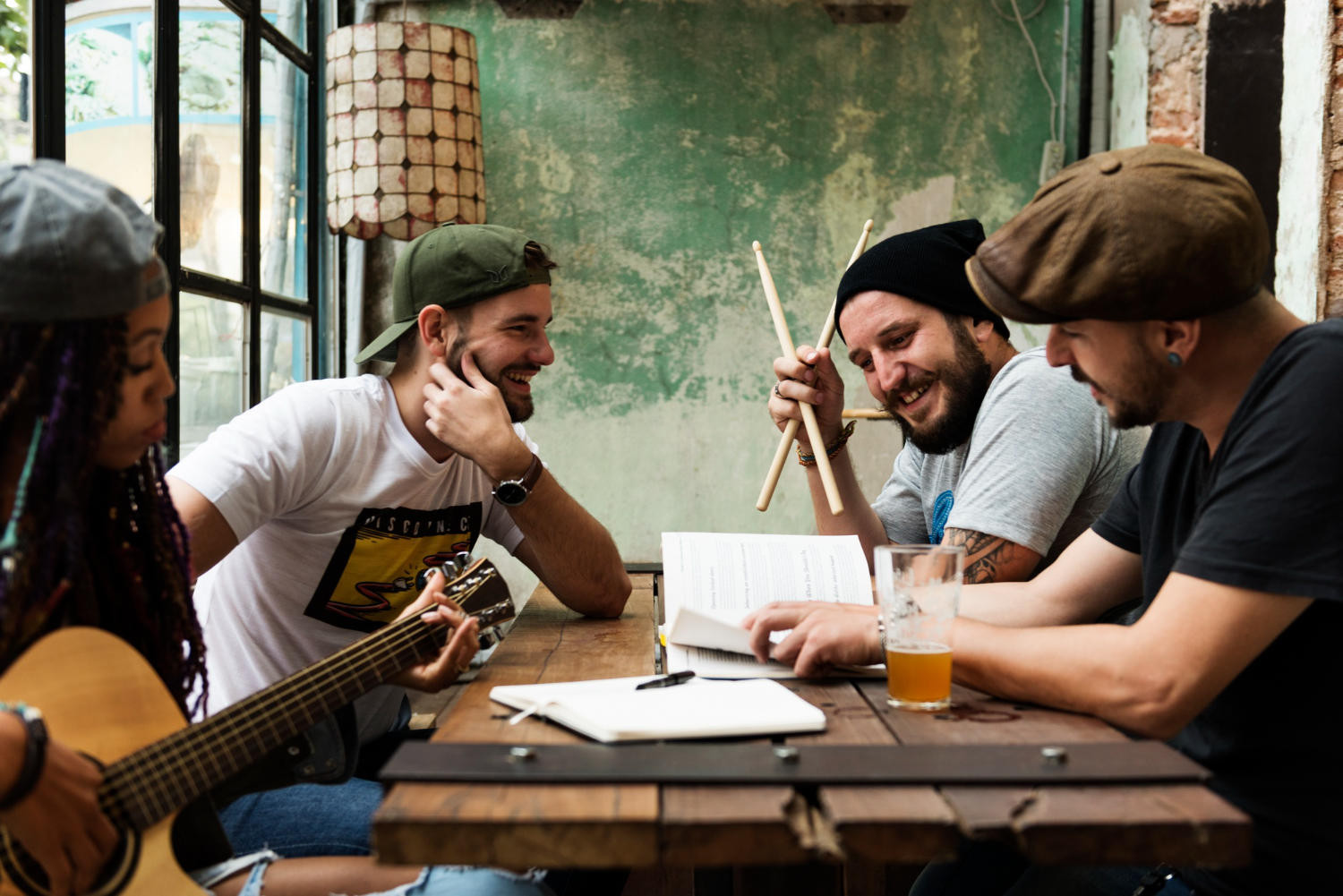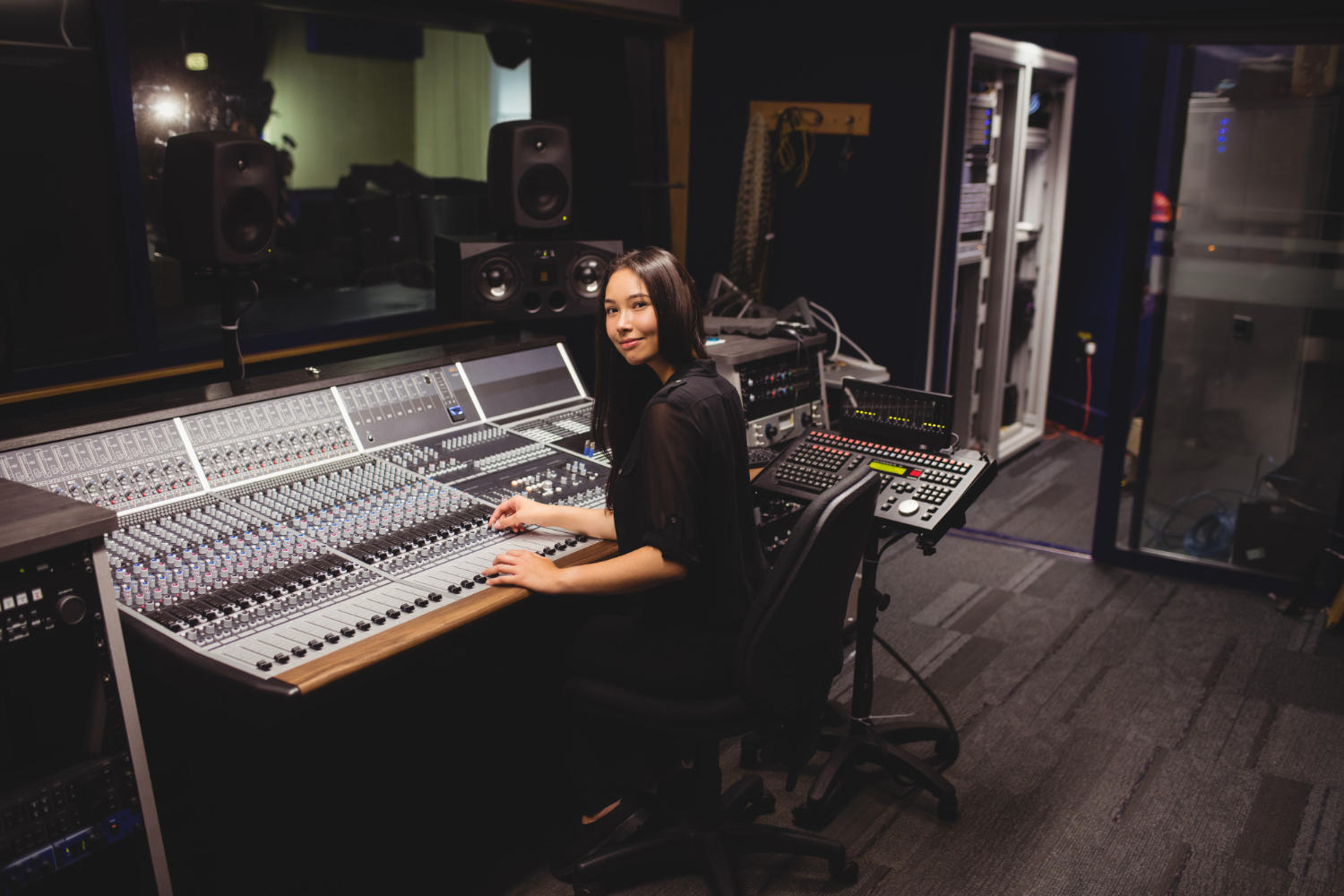Music production is an amazing creative field perfect for anyone enthusiastic about making, listening to, or simply being involved in music.
It’s not for the faint of heart since, like any creative and competitive field, it can be difficult to find your initial big break and you will face failures as much as success.
But, a musical artist knows that failing is just part of the process of success!
So how can you get started in this interesting and artistic career? In this guide, we’ll cover the basics so you can learn how to plan your pathway to becoming a music producer.

What Does a Music Producer Do?
If you want to learn how to be a music producer, first you need to know what a music producer does.
Music producers help take musical artist’s ideas to the next level, getting the arrangements and music written and ready for recording. Afterward, they edit the tracks through methods like mixing and mastering to create amazing music that appeals to the intended audience while creating a sonic soundscape true to the artist’s original intentions.
Many music producers are also musicians, and many musicians produce their own music, at least to start with.
So if you’re an indie artist looking to become a songwriter/musician/producer or if you want to have a hand in guiding other artists’ dreams to fruition, learning music production is a wise choice!
Is It Hard to Be a Music Producer?
Depending on your personality, musicality, and technical skills, music production might come naturally to you, or it can be a little more difficult.
As long as you dedicate time to learning music theory, music producing theory and skills, and keep up with new trends and technology, you should be able to possess the skills needed for music production.
Of course, you must also have an innate creative skill and an ear for music. If music is a complicated subject for you or you don’t understand the industry, you’ll likely struggle in the music production field.

How to Become a Music Producer in Five Steps
So, how can you go from a music enthusiast and indie musician to a full-fledged producer? The steps are simple, but they may not be easy.
If you want to get into music producing, you’ll need to embrace going outside of your comfort zone, at least sometimes, so be sure to prepare for that aspect of the industry!
Let’s learn how to get into music production!
Step 1: Education
No matter what your educational path looks like (more on that in the next section), to learn to be a music producer, you first need to have a solid foundation in music as a concept.
You should be familiar with things like music theory, instrument playing, singing, and everything that goes into a produced track, like arrangement and how to determine what sounds good.
A lot of these skills are learned, but a lot of them are innate; a tone-deaf person can’t learn enough about music to be a reliable music producer because they physiologically cannot decipher music well, for example.
You must have an ear for music.
Additionally, you should have a rudimentary understanding of DAWs, the parts of a produced song, and the general aim of what you want to achieve when you have tracks loaded into your software.
Step 2: Build Your Studio
Once you know a thing or two about music and the equipment needed for production, you can start investing in the technology for your own use. You don’t have to get the best of the best to start with; you just need to be able to hone your skills and practice.
Instead of buying your own equipment, you can also see if it’s possible to rent music producing equipment or time at a studio to work on your music-production skills.
Here is a basic list of music producing equipment for beginners.
Music Producing Equipment List
| Equipment | Notes |
|---|---|
| Computer | Must have a fast processor, ample RAM (at least 8 GB), and generous storage space |
| Digital Audio Workstation (DAW) | Software such as Ableton Live, FL Studio, Logic Pro X, and GarageBand |
| Plugins and Virtual Instruments | VST (Virtual Studio Technology) such as Native Instruments' Kontakt |
| MIDI Controller | Required for using virtual instrumentation and software synths in the DAW |
| Audio Interface | To plug in your instruments, microphone, headphones, studio monitors |
| Studio Monitors | Regular speakers will not give you the true sound of the instruments |
| Headphones | Look for a neutral sound signature |
| Microphone | Consider a versatile condenser microphone or a dynamic microphone |
| Connection Cables | Invest in quality cables to ensure true sound and data translation |
| Sound Treatments | Filters for mics, sound-dampening foam, bass traps |
Step 3: Mastering the Tools
Either on your own, with a music production course, or with a tutor, practice using your chosen DAW(s) and equipment. You need to get really good at this part!
Learning how to use the tools of your trade fluently will allow you to be able to explore new ideas and experiment with ease since you’ll understand what you’re doing and how to do it without a lot of struggle to get the software to do what you want. Use plugins, different methodologies, and experimental techniques to learn music forward and back.
Virtual instruments, such as synths or sampled instruments, provide a vast palette of sounds to choose from. Explore different genres and experiment with sound design to find your signature style.
Remember, mastering the tools takes time and practice. Don't be discouraged if it feels overwhelming at first. Start with simple projects and gradually challenge yourself with more complex compositions. Learning from tutorials, music production class near me, forums, and online communities can also help you discover new techniques and approaches.
Kingsley Rosario is a youth music prodigy, having been producing incredible beats and tracks since he was only 5 years old. We can't all be this talented, but natural ability is important in the creative field of music production!
Step 4: Develop Your Talent
Once you have experimented enough to know what you’re doing, it’s time to seriously practice producing your own music and/or your friends’ music. Create projects, practice giving yourself deadlines, and build a portfolio.
Making finished products helps you understand the entire process from a spark of an idea all the way to formatting the finished product for distribution.
Collaborate as much as possible to get ideas from other artists and build your network. Work hard to create 5-10 incredible finished pieces for your audio portfolio, as well as smaller projects to showcase a specific skill if you’d like.
Step 5: Network and Collaborate
Building a network of like-minded individuals is crucial in the music industry. Connect with other musicians, producers, and industry professionals to expand your network. Attend music events, conferences, and workshops to meet people who share your passion.
Collaborations can provide valuable learning opportunities and exposure to new ideas. Working with vocalists, instrumentalists, or other producers can bring fresh perspectives to your music. It allows you to combine your skills and create something unique together.
Utilize social media platforms and online communities to showcase your work and connect with a wider audience. Share your music, engage with your followers, and seek feedback to improve your craft. Building a strong online presence can open doors to exciting opportunities and collaborations.
Get your name out there by being present in the real-life and virtual music community locally and more widely. Distribute samples, business cards, and marketing materials, and lend a helping hand when you can. Perform live and attend performances by other artists to support them and grow your network.
Getting people to think about you and remember you are hard at first in a creative business like this, so make sure you make yourself memorable!
Eventually, your work history will speak for itself and people will come to you because they like what you do. This, my friend, is how to get into music production.


Education Required for Music Production
While it’s not strictly necessary for music producers to have formal education, earning a degree in Music Business, Music Theory, Music Production, Audio Technology, or a related field can be greatly beneficial.
In a formal program, you will have access to software and equipment that can be too hefty of an investment for an average person to buy and experiment with. Of course, you’ll also have knowledgeable professors to teach you about theory, how to use the equipment and the software, industry standards, and more.
In lieu of an associate or bachelor program, you can also seek out certificate programs, or you can learn on your own! Another alternative is to seek the tutelage of an experienced music producer, for example, you can find music theory and production tutors online and in person with Superprof!
What is the Average Music Producer Salary?
You’re probably wondering: How much does a music producer make?
The answer varies depending on many factors, like your physical location, your level of expertise, whether you’re freelance or working for a music production company, and the types of artists you work with.
The overall average salary for a music producer in the US in 2023 was $58k per year, and the median figure was $85k per year. The overall range was around $53k to $118k per year.
Where words fail, a producer’s touch speaks.
Jai Paul
Average Yearly Salaries for Different Music Producer Jobs
| Job Title | Avg Yearly Salary |
|---|---|
| Mastering Engineer | $100k |
| Copyist | $83k |
| A&R Coordinator | $75k |
| Sound Mixer | $71k |
| Audio Technician | $70k |
| Sound Editor | $64k |
| Sound Designer | $62k |
| Digital Audio Editor | $60k |
| Music Producer | $58k |
| Recording Engineer | $58k |
| Recording Studio Engineer | $57k |
| Foley Artist | $52k |
| Recording Studio Manager | $48k |
| Recording Studio Technician | $44k |
| Lyricist | $35k |
Resources for Aspiring Music Producers
As an aspiring music producer, it's essential to stay updated with the latest trends, techniques, and tools in the industry. Here are some valuable resources to help you on your journey:
- Music production forums and communities: Joining online communities like Reddit's r/WeAreTheMusicMakers can provide a platform for discussions, feedback, and collaboration with fellow producers.
- YouTube channels: Many music producers and educators share their knowledge and tutorials on YouTube. Channels like "Produce Like A Pro" and "In The Mix" offer valuable insights and tips for music production.
- Books and literature: There are numerous books available that delve into the technical and creative aspects of music production. "Mixing Secrets for the Small Studio" by Mike Senior and "The Complete Idiot's Guide to Music Composition" by Michael Miller are highly recommended reads.
Remember, learning is a continuous process, and staying curious and open-minded will help you grow as a music producer.
Ready to Get Started as a Music Producer?
Becoming a music producer requires dedication, passion, and continuous learning. Hone your skills, assemble a professional network, and create music that resonates with your style, soul, and audience, and you’ll build an amazing career for yourself!
You can expedite your music production learning when you take lessons from a professional music production coach on Superprof! Find the best, most convenient online classes for music and in person with a coach who can teach you whatever it is you want to know so you can start unleashing your creativity with deftness!
Summarize with AI:















